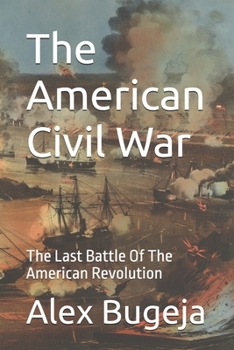The American Civil War: The Last Battle Of The American Revolution
This comprehensive history presents the American Civil War not as a beginning, but as the brutal and tragically necessary conclusion to a revolution left unfinished. It argues that the central paradox of America's founding-a fight for liberty in an age of widespread slavery-created a volatile contradiction that the nation's founders bequeathed to their children. Detailing the foundational compromises embedded in the Constitution, from the Three-Fifths Clause to the Fugitive Slave Clause, the book reveals how two Americas emerged, each believing it was the true heir to the Spirit of '76. This meticulously researched narrative frames the conflict as the final, terrible battle to resolve the nation's original sin and determine its ultimate identity.
The road to war is traced through the decades of mounting tension that tore the nation apart. From the fragile political bargains that papered over the growing chasm between North and South, to the moral fire of the abolitionist movement that fanned the flames of freedom, every crucial step is examined. The narrative brings to life the explosive conflicts of the 1850s-the violent dress rehearsal of "Bleeding Kansas," the polarizing Dred Scott decision, John Brown's doomed raid, and the election of Abraham Lincoln-that finally shattered the delicate balance. Readers will understand not just what happened, but why the political system fractured, leading eleven states to secede and form a new nation dedicated to the preservation of slavery.
From the first shots at Fort Sumter to the final surrender at Appomattox, the epic and savage military struggle is chronicled in vivid detail. The book covers both the Eastern and Western Theaters, moving from the rude awakening at Bull Run to the strategic turning points at Antietam, Vicksburg, and Gettysburg. It explores the relentless campaigns of Grant, the audacious generalship of Lee, and the devastating "total war" of Sherman. Beyond the great battles, the narrative delves into the critical war at sea, detailing the Union blockade that strangled the Confederacy, the exploits of commerce raiders, and the revolutionary clash of ironclads that forever changed naval warfare. It is a story of ordinary soldiers in blue and gray, of technological innovation, and of a conflict that grew from a limited war into a continent-spanning cataclysm.
More than just a military history, this work explores how the war transformed American society. It charts the evolution of the conflict's purpose, culminating in Lincoln's Emancipation Proclamation and his vision of "a new birth of freedom." The narrative continues past the battlefield to chronicle the profound tragedy of Lincoln's assassination and the tumultuous era of Reconstruction that followed. It examines the promise and perils of the Freedmen's Bureau, the defiant rise of the Black Codes and the Ku Klux Klan, and the epic constitutional struggle between a stubborn president and a radical Congress that led to the impeachment of Andrew Johnson, all part of the "unfinished work" of establishing true freedom.
Ultimately, the book offers a powerful assessment of the Civil War's enduring legacy. The conflict resolved the question of secession, forged a new, more powerful centralized nation, and spurred the industrialization of the North while leaving the South in ruins. It amended the Constitution to abolish slavery and grant citizenship to four million newly freed people, yet also gave rise to the "Lost Cause" mythology that would justify the reimposition of white supremacy. It was the crucible that tested the founding ideals of the nation, providing definitive answers to old questions while creating new, urgent ones about the meaning of equality and justice. The war transformed the United States, and its unresolved legacies continue to shape the nation today.
Related Subjects
History




